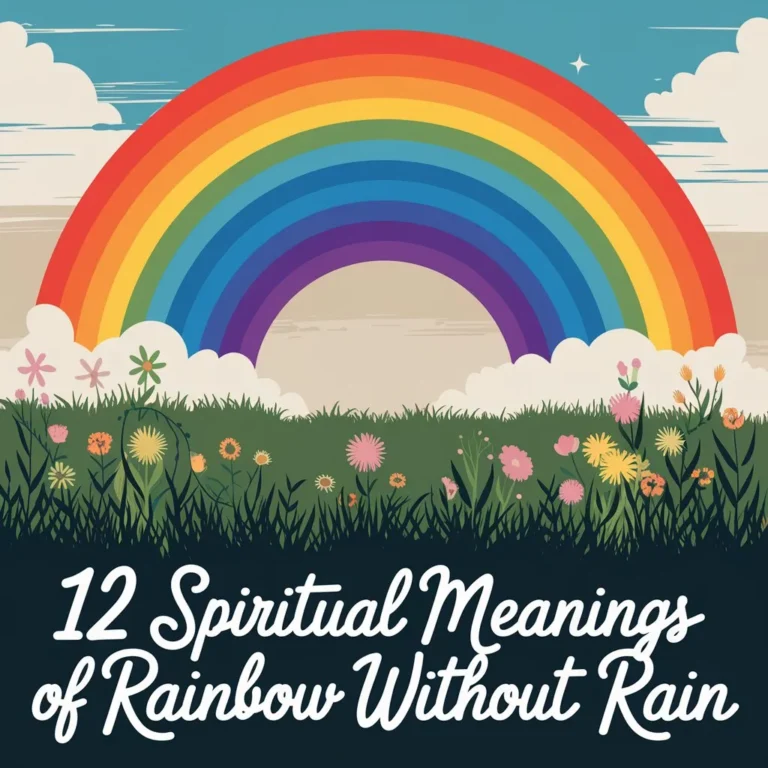12 Spiritual Meanings of Selah: Pause & Sacred Reflection
You have likely seen the word “Selah” in the Psalms, but have you thought about its meaning? This word invites you to stop and reflect. It offers a special time for insight and connection. In a busy world, practicing Selah is important for spiritual growth and emotional clarity. What could happen when you take these moments of quiet in your life? Let’s look at the meaningful layers behind this important invitation.
Key Takeaways
- Selah invites believers to pause and reflect on God’s Word, enhancing spiritual connection and understanding.
- This concept emphasizes the importance of mindful pauses to foster emotional well-being and clarity in daily life.
- Engaging in contemplative reading of the Psalms cultivates deeper insights and spiritual growth through silent reflection.
- Incorporating Selah into daily routines encourages intentional journaling and peaceful moments for personal growth.
- Therapeutic silence derived from Selah aids emotional recovery and promotes inner peace, essential for personal resilience.
Understanding the Definition of Selah
Selah is a term found in the Psalms that means to pause and reflect. Its exact Biblical meaning is unclear, but it prompts you to take time to think about the verses.
In your spiritual journey, Selah encourages you to practice reflection, helping you understand your faith and yourself better. When you see Selah, recognize it as a chance to connect with God’s Word.
This moment isn’t just about silence; it’s about listening actively and finding your spiritual rhythm. Embracing Selah gives you a sense of community, as you join many others who contemplate faith and meaning together.
The Call to Pause in Modern Life
In a fast-paced world where speed is often valued, taking time to pause can be refreshing.
In the midst of modern distractions, a short break allows for reconnection with yourself. This pause isn’t just about quiet; it focuses on living with intention. When you take a step back, you create space for reflection, gratitude, and clarity.
This choice to pause can change your outlook and help you see the beauty in everyday life. Instead of getting lost in chaos, you build a sense of belonging and strengthen your connections with others and yourself.
Spiritual Reflection in the Psalms
Taking time for spiritual reflection can enhance your understanding of yourself and your surroundings. The Psalms offer vivid imagery that encourages contemplation. As you practice reflection, think about how it guides you to find inner peace.
- Contemplative reading helps you learn from each verse.
- Scriptural meditation provides insights that refresh your spirit.
- Worshipful silence creates a space where you can discover deeper truths.
These practices promote a slower pace, moving you from distractions to spiritual renewal. Embracing the Psalms in this way fosters a stronger sense of belonging in your faith and community.
Selah as a Moment of Gratitude
The word “Selah” encourages you to pause. This pause creates a moment for gratitude in your daily life. Embracing this moment means recognizing the richness of your experiences.
During this time, you can feel grateful for both small joys and significant milestones. These moments of thankfulness help you connect with what matters most.
By adding gratitude to your daily routine, you build a stronger sense of belonging and purpose. In these quiet moments, your heart opens.
You find peace and strength that support you as you move forward.
The Importance of Listening to Silence
Listening to silence can lead to important insights amid everyday noise. Embracing silence can help you develop valuable skills and gain benefits:
- Inner Peace: Quiet moments foster self-reflection and calmness.
- Mental Clarity: Silence allows thoughts to become clearer, aiding in decision-making and focus.
- Emotional Healing: Listening to your inner voice supports emotional health and healing.
Deepening Our Relationship With God
To build a deeper relationship with God, set aside time for silence and reflection. In these moments, engage in open conversations that strengthen your connection and faith.
These pauses can lead to spiritual insight, helping you understand God and yourself better. As you trust and share your heart, you deepen your communication with the divine, aligning your soul with His guidance.
Embrace stillness; it feeds your spirit and creates a sense of belonging. Each moment of reflection reinforces your bond with God and connects your dreams with His direction.
As you grow closer, find comfort in knowing you aren’t alone in your journey to connect with the divine.
Cultivating Mindfulness Through Selah
Selah encourages you to pause and focus on the present moment. This practice can help you connect more deeply with your thoughts and feelings.
Here are three simple ways to incorporate Selah into your daily routine:
- Mindful Breathing: Spend a few moments breathing deeply. Each inhale and exhale will bring you back to the present.
- Intentional Journaling: Write down your thoughts and feelings. This creates space for new insights and personal growth.
- Nature Connection: Go outside and observe the details of your surroundings. This will help strengthen your connection to nature.
The Role of Selah in Prayer
Incorporating Selah into your prayer practice can strengthen your connection with the divine. By taking sacred pauses, you create time to reflect and allow your spirit to align with your prayers.
These moments of stillness help you listen, enhancing your communication with the divine. During these pauses, think about what you have expressed and what you truly desire.
In these quiet moments, you’ll remember that you belong to a larger spiritual whole. Selah serves as a bridge, encouraging you to think about the deeper meanings behind your words and wishes.
This practice helps you build a stronger relationship with the sacred, enriching your spiritual journey.
Selah as a Means of Healing
Taking a moment to pause can be a powerful way to heal your spirit. The idea of “Selah” gives you a chance for emotional recovery and overall wellness. This practice connects your mind and body, helping you reflect and grow.
- Therapeutic Silence: Quiet moments support emotional healing. They allow you to process experiences without distractions.
- Mindful Awareness: Mindfulness helps you understand yourself better. It provides tools for personal discovery on your journey.
- Inner Peace: These pauses create a sense of calm. This calm is important for personal growth and strength during tough times.
Embracing these moments can make a difference in your emotional health and spiritual journey.
The Connection Between Selah and Worship
Pausing for reflection can enhance worship experiences. Incorporating Selah into your worship practices allows for deeper connection. When you pause intentionally, the lyrics resonate during communal worship.
These moments foster personal devotion and a link to the sacred. Silence during rituals adds meaning and offers space for thought in expressive worship. Each Selah reminds you to appreciate the presence of the Divine, strengthening bonds within your faith community.
This focus on intentionality enriches your spiritual journey and deepens your understanding of worship’s impact on your heart and soul.
Finding Clarity Amidst Chaos
Life often presents distractions and chaos. To find clarity, you need simple and effective strategies. Here are some techniques you can use:
- Deep Breathing: Spend a few minutes taking deep breaths. This helps calm your mind and manage emotions.
- Mindfulness: Focus on the present. Observe your thoughts without judgment.
- Routine: Create daily habits that give you stability and a sense of belonging.
Using these practices can help you relieve stress and feel spiritually grounded.
They allow you to filter out noise, helping you find peace amid chaos.
Incorporating Selah Into Daily Life
Many people miss the value of “Selah,” a practice based on reflection and thought. By adding Selah to your daily routine, you create moments of mindfulness that turn normal activities into meaningful experiences.
Begin by setting daily rituals that include planned pauses, such as during meals or while traveling. Use reflective activities that cultivate gratitude, helping you recognize the good things in your life. Include awareness exercises to boost your spiritual mindfulness, allowing the calming effects of silence to flow over you.
These techniques can help reduce stress and build a stronger sense of connection. When you take time to reflect, you’ll discover a feeling that aligns with your spirit, making each day a journey full of purpose and peace.
Frequently Asked Questions
Where Does the Term “Selah” Originate From?
The term “selah” comes from the Bible, mainly in the Psalms. Its use indicates a pause for reflection. This encourages readers to think about the meaning of the verses, promoting a connection within the faith community.
Is “Selah” Used in Other Religious Texts?
“Selah” mainly appears in Hebrew texts. Its use in other religious writings is not well-defined. You can examine different religious sources to find similar moments for reflection. This exploration can deepen your understanding of sacred pauses.
How Can Selah Enhance Personal Meditation Practices?
Incorporating selah into your meditation practice enhances your experience through mindful breathing and silent moments. It allows you to pause and reflect, helping you connect with your thoughts and feelings. This practice fosters a deeper sense of belonging within yourself. Enjoy the calm and clarity that comes from these moments of stillness.
Are There Different Interpretations of Selah’s Meaning?
Selah has various meanings influenced by its historical and theological context. Different interpretations may resonate based on your personal experiences. This word can invite reflection and deeper understanding in your spiritual journey. Explore these meanings to enrich your insights.
How Can Children Practice the Concept of Selah?
To help children practice mindful pauses, you can encourage them to take short breaks during their activities. After these breaks, invite them to share their thoughts and feelings. This can promote creativity and self-expression, helping children feel connected and aware of themselves in a supportive space.

Liza Stockholm is an esteemed spiritual guide and the visionary behind Spiritual with Liza. With a profound passion for empowering others on their spiritual journey, Liza offers a blend of educational content and personal guidance. Her expertise in spirituality is rooted in years of dedicated practice and study, making her a trusted companion for those seeking enlightenment and inner peace.





